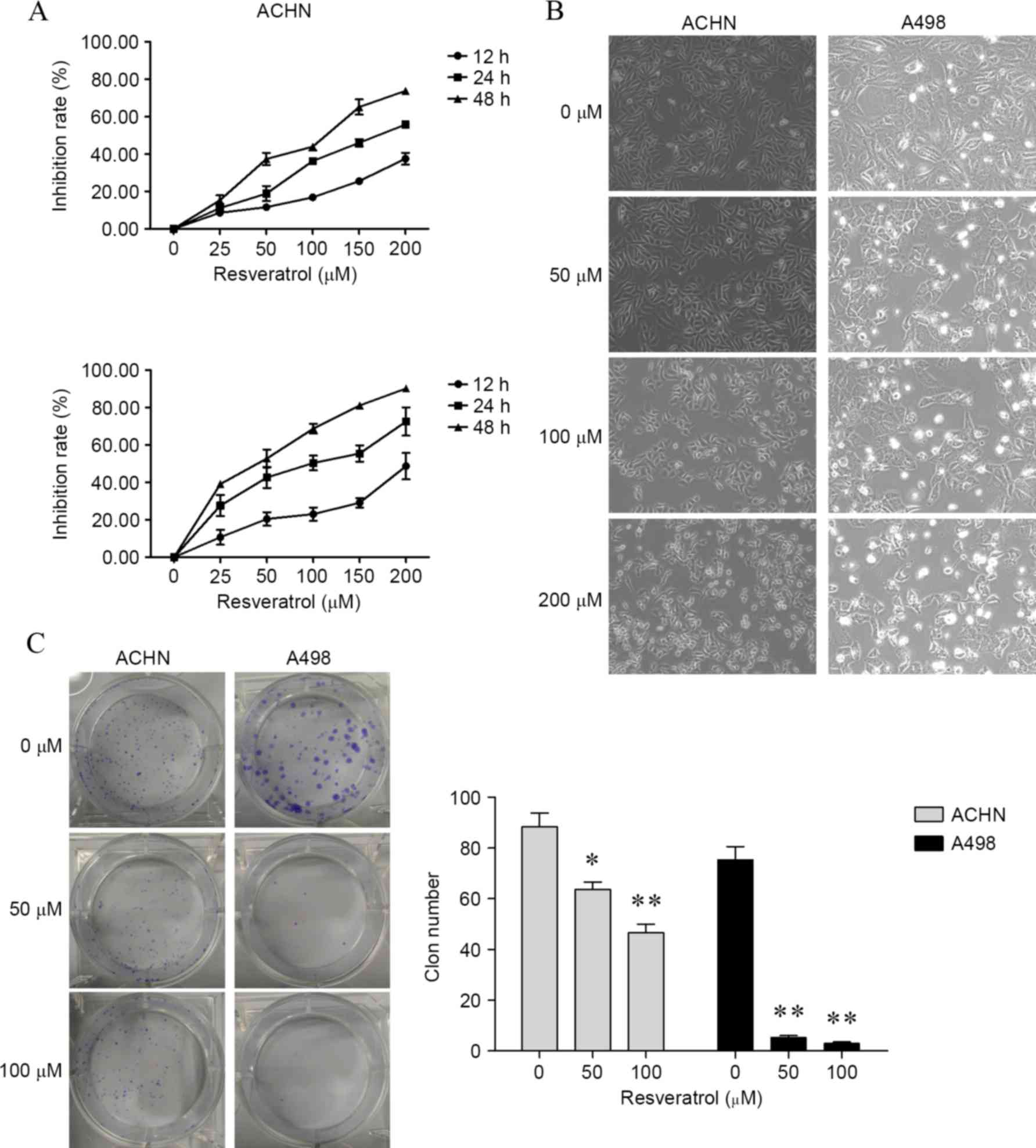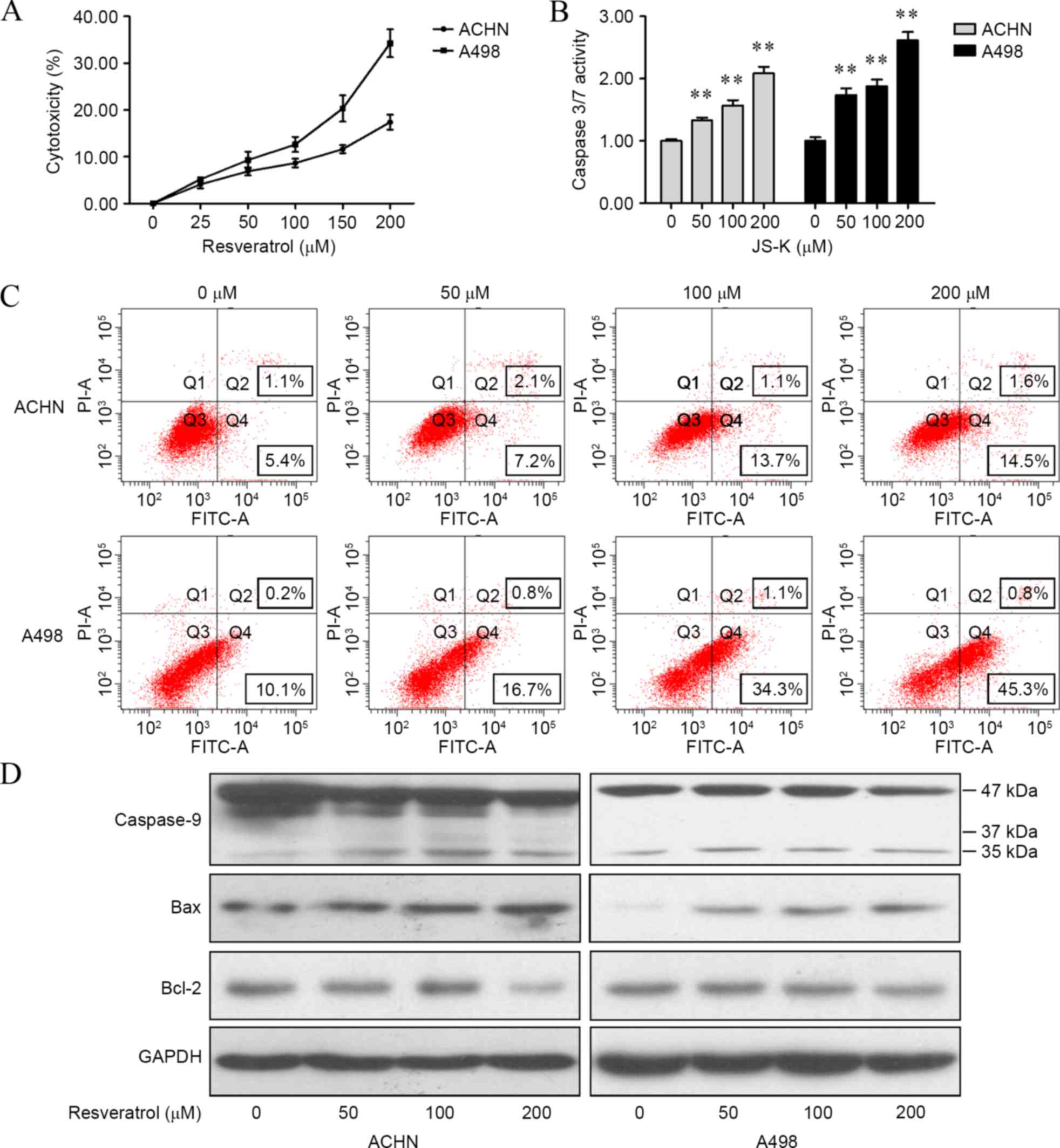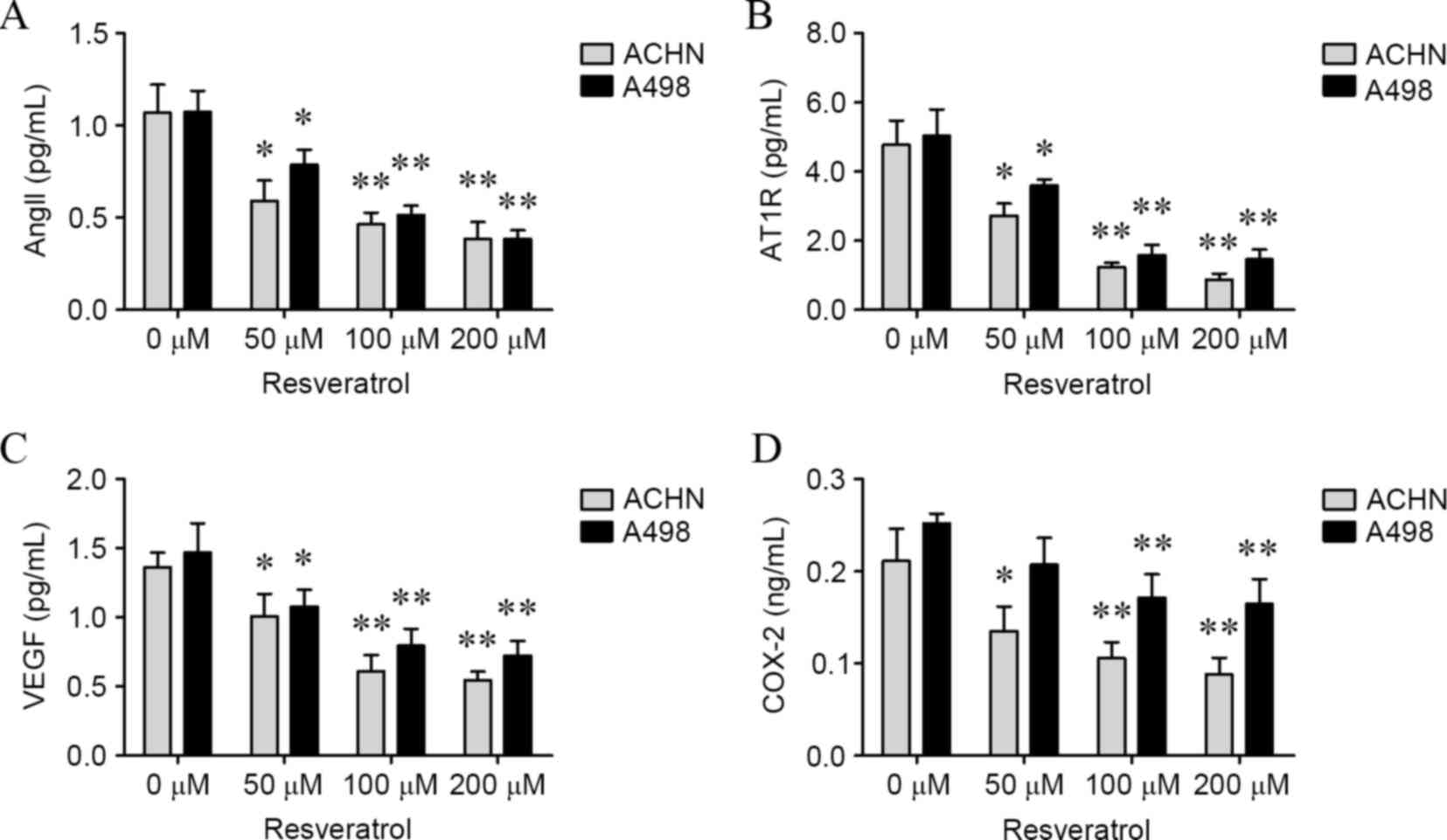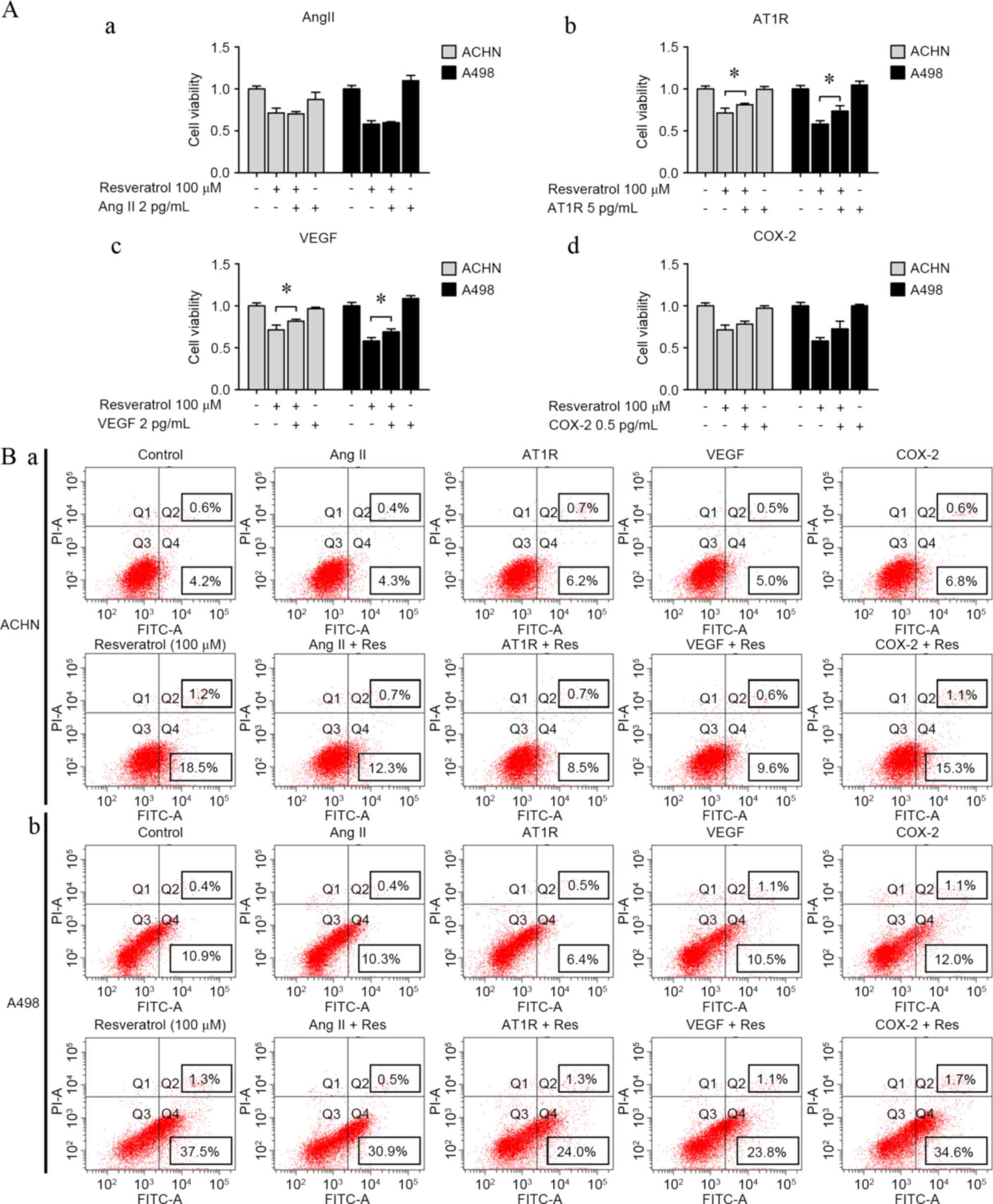|
1
|
Aggarwal BB, Bhardwaj A, Aggarwal RS,
Seeram NP, Shishodia S and Takada Y: Role of resveratrol in
prevention and therapy of cancer: Preclinical and clinical studies.
Anticancer Res. 24:2783–2840. 2004.PubMed/NCBI
|
|
2
|
Carter LG, D'Orazio JA and Pearson KJ:
Resveratrol and cancer: Focus on in vivo evidence. Endocr-Relat
Cancer. 21:R209–R225. 2014. View Article : Google Scholar : PubMed/NCBI
|
|
3
|
Ndiaye M, Kumar R and Ahmad N: Resveratrol
in cancer management: Where are we and where we go from here? Ann N
Y Acad Sci. 1215:144–149. 2011. View Article : Google Scholar : PubMed/NCBI
|
|
4
|
Reagan-Shaw S, Mukhtar H and Ahmad N:
Resveratrol imparts photoprotection of normal cells and enhances
the efficacy of radiation therapy in cancer cells. Photochem
Photobiol. 84:415–421. 2008. View Article : Google Scholar : PubMed/NCBI
|
|
5
|
Wu ML, Li H, Yu LJ, Chen XY, Kong QY, Song
X, Shu XH and Liu J: Short-term resveratrol exposure causes in
vitro and in vivo growth inhibition and apoptosis of bladder cancer
cells. PLoS One. 9:e898062014. View Article : Google Scholar : PubMed/NCBI
|
|
6
|
Nishimura H: Renin-angiotensin system in
vertebrates: Phylogenetic view of structure and function. Anat Sci
Int. Oct 7–2016.(Epub ahead of print). View Article : Google Scholar : PubMed/NCBI
|
|
7
|
Bradshaw AR, Wickremesekera AC, Brasch HD,
Chibnall AM, Davis PF, Tan ST and Itinteang T: Glioblastoma
multiforme cancer stem cells express components of the
renin-angiotensin system. Front Surg. 3:512016. View Article : Google Scholar : PubMed/NCBI
|
|
8
|
Yoshida T, Kinoshita H, Fukui K, Matsuzaki
T, Yoshida K, Mishima T, Yanishi M, Komai Y, Sugi M, Inoue T, et
al: Prognostic impact of renin-angiotensin inhibitors in patients
with bladder cancer undergoing radical cystectomy. Ann Surg Oncol.
Oct 11–2016.(Epub ahead of print). View Article : Google Scholar
|
|
9
|
Miyajima A, Yazawa S, Kosaka T, Tanaka N,
Shirotake S, Mizuno R, Kikuchi E and Oya M: Prognostic impact of
renin-angiotensin system blockade on renal cell carcinoma after
surgery. Ann Surg Oncol. 22:3751–3759. 2015. View Article : Google Scholar : PubMed/NCBI
|
|
10
|
Yang R, Zhang H and Zhu L: Inhibitory
effect of resveratrol on the expression of the VEGF gene and
proliferation in renal cancer cells. Mol Med Rep. 4:981–983.
2011.PubMed/NCBI
|
|
11
|
Shirotake S, Miyajima A, Kosaka T, Tanaka
N, Kikuchi E, Mikami S, Okada Y and Oya M: Regulation of monocyte
chemoattractant protein-1 through angiotensin II type 1 receptor in
prostate cancer. Am J Pathol. 180:1008–1016. 2012. View Article : Google Scholar : PubMed/NCBI
|
|
12
|
Crowley SD and Coffman TM: Recent advances
involving the renin-angiotensin system. Exp Cell Res.
318:1049–1056. 2012. View Article : Google Scholar : PubMed/NCBI
|
|
13
|
Arrieta O, PinedaOlvera B, GuevaraSalazar
P, Hernández-Pedro N, Morales-Espinosa D, Cerón-Lizarraga TL,
González-De la Rosa CH, Rembao D, Segura-Pacheco B and Sotelo J:
Expression of AT1 and AT2 angiotensin receptors in astrocytomas is
associated with poor prognosis. Br J Cancer. 99:160–166. 2008.
View Article : Google Scholar : PubMed/NCBI
|
|
14
|
Li SH, Lu HI, Chang AY, Huang WT, Lin WC,
Lee CC, Tien WY, Lan YC, Tsai HT and Chen CH: Angiotensin II type I
receptor (AT1R) is an independent prognosticator of esophageal
squamous cell carcinoma and promotes cells proliferation via mTOR
activation. Oncotarget. Aug 24–2016.(Epub ahead of print).
|
|
15
|
Dolley-Hitze T, Jouan F, Martin B, Mottier
S, Edeline J, Moranne O, Le Pogamp P, Belaud-Rotureau MA, Patard
JJ, Rioux-Leclercq N and Vigneau C: Angiotensin-2 receptors (AT1-R
and AT2-R), new prognostic factors for renal clear-cell carcinoma?
Br J Cancer. 103:1698–1705. 2010. View Article : Google Scholar : PubMed/NCBI
|
|
16
|
Passos-Silva DG, VeranoBraga T and Santos
RA: Angiotensin-(1–7): Beyond the cardio-renal actions. Clin Sci
(Lond). 124:443–456. 2013. View Article : Google Scholar : PubMed/NCBI
|
|
17
|
Ferrara N and Kerbel RS: Angiogenesis as a
therapeutic target. Nature. 438:967–974. 2005. View Article : Google Scholar : PubMed/NCBI
|
|
18
|
Ferrara N, Gerber HP and LeCouter J: The
biology of VEGF and its receptors. Nat Med. 9:669–676. 2003.
View Article : Google Scholar : PubMed/NCBI
|
|
19
|
Cheng YD, Yang H, Chen GQ and Zhang ZC:
Molecularly targeted drugs for metastatic colorectal cancer. Drug
Des Devel Ther. 7:1315–1322. 2013.PubMed/NCBI
|
|
20
|
Ding C, Li L, Yang T, Fan X and Wu G:
Combined application of anti-VEGF and anti-EGFR attenuates the
growth and angiogenesis of colorectal cancer mainly through
suppressing AKT and ERK signaling in mice model. BMC Cancer.
16:7912016. View Article : Google Scholar : PubMed/NCBI
|
|
21
|
Anandanadesan R, Gong Q, Chipitsyna G,
Witkiewicz A, Yeo CJ and Arafat HA: Angiotensin II induces vascular
endothelial growth factor in pancreatic cancer cells through an
angiotensin II type 1 receptor and ERK1/2 signaling. J Gastrointest
Surg. 12:57–66. 2008. View Article : Google Scholar : PubMed/NCBI
|
|
22
|
Hoellen F, Waldmann A, BanzJansen C, Rody
A, Heide M, Köster F, Ribbat-Idel J, Thorns C, Gebhard M,
Oberländer M, et al: Expression of cyclooxygenase-2 in cervical
cancer is associated with lymphovascular invasion. Oncol Lett.
12:2351–2356. 2016.PubMed/NCBI
|
|
23
|
Ali-Fehmi R, Morris RT, Bandyopadhyay S,
Che M, Schimp V, Malone JM Jr and Munkarah AR: Expression of
cyclooxygenase-2 in advanced stage ovarian serous carcinoma:
Correlation with tumor cell proliferation, apoptosis, angiogenesis,
and survival. Am J Obstet Gynecol. 192:819–825. 2005. View Article : Google Scholar : PubMed/NCBI
|
|
24
|
Subbaramaiah K and Dannenberg AJ:
Cyclooxygenase 2: A molecular target for cancer prevention and
treatment. Trends Pharmacol Sci. 24:96–102. 2003. View Article : Google Scholar : PubMed/NCBI
|
|
25
|
Schmedtje JF Jr, Ji YS, Liu WL, DuBois RN
and Runge MS: Hypoxia induces cyclooxygenase-2 via the NF-kappaB
p65 transcription factor in human vascular endothelial cells. J
Biol Chem. 272:601–608. 1997. View Article : Google Scholar : PubMed/NCBI
|
|
26
|
Lee JJ, Natsuizaka M, Ohashi S, Wong GS,
Takaoka M, Michaylira CZ, Budo D, Tobias JW, Kanai M, Shirakawa Y,
et al: Hypoxia activates the cyclooxygenase-2-prostaglandin E
synthase axis. Carcinogenesis. 31:427–434. 2010. View Article : Google Scholar : PubMed/NCBI
|
|
27
|
Rüegg C, Dormond O and Mariotti A:
Endothelial cell integrins and COX-2: Mediators and therapeutic
targets of tumor angiogenesis. Biochim Biophys Acta. 1654:51–67.
2004.PubMed/NCBI
|
|
28
|
Yaseen A, Chen S, Hock S, Rosato R, Dent
P, Dai Y and Grant S: Resveratrol sensitizes acute myelogenous
leukemia cells to histone deacetylase inhibitors through reactive
oxygen species-mediated activation of the extrinsic apoptotic
pathway. Mol Pharmacol. 82:1030–1041. 2012. View Article : Google Scholar : PubMed/NCBI
|
|
29
|
Singh N, Nigam M, Ranjan V, Zaidi D, Garg
VK, Sharma S, Chaturvedi R, Shankar R, Kumar S, Sharma R, et al:
Resveratrol as an adjunct therapy in cyclophosphamide-treated MCF-7
cells and breast tumor explants. Cancer Sci. 102:1059–1067. 2011.
View Article : Google Scholar : PubMed/NCBI
|
|
30
|
Shi Y, Yang S, Troup S, Lu X, Callaghan S,
Park DS, Xing Y and Yang X: Resveratrol induces apoptosis in breast
cancer cells by E2F1-mediated up-regulation of ASPP1. Oncol Rep.
25:1713–1719. 2011.PubMed/NCBI
|
|
31
|
Chottanapund S, Van Duursen MB, Navasumrit
P, Hunsonti P, Timtavorn S, Ruchirawat M and Van den Berg M:
Anti-aromatase effect of resveratrol and melatonin on hormonal
positive breast cancer cells co-cultured with breast adipose
fibroblasts. Toxicol In Vitro. 28:1215–1221. 2014. View Article : Google Scholar : PubMed/NCBI
|
|
32
|
Leon-Galicia I, DiazChavez J, GarciaVilla
E, UribeFigueroa L, HidalgoMiranda A, Herrera LA, AlvarezRios E,
GarciaMena J and Gariglio P: Resveratrol induces downregulation of
DNA repair genes in MCF-7 human breast cancer cells. Eur J Cancer
Prev. 22:11–20. 2013. View Article : Google Scholar : PubMed/NCBI
|
|
33
|
Fraser SP, Peters A, FlemingJones S,
Mukhey D and Djamgoz MB: Resveratrol: Inhibitory effects on
metastatic cell behaviors and voltage-gated Na+ channel
activity in rat prostate cancer in vitro. Nutr Cancer.
66:1047–1058. 2014. View Article : Google Scholar : PubMed/NCBI
|
|
34
|
Mikula-Pietrasik J, Sosińska P and Książek
K: Resveratrol inhibits ovarian cancer cell adhesion to peritoneal
mesothelium in vitro by modulating the production of α5β1 integrins
and hyaluronic acid. Gynecol Oncol. 134:624–630. 2014. View Article : Google Scholar : PubMed/NCBI
|
|
35
|
Chen YJ, Chen YY, Lin YF, Hu HY and Liao
HF: Resveratrol inhibits alpha-melanocyte-stimulating hormone
signaling, viability, and invasiveness in melanoma cells. Evid
Based Complement Alternat Med. 2013:6321212013.PubMed/NCBI
|
|
36
|
Wen S, Li H, Wu ML, Fan SH, Wang Q, Shu
XH, Kong QY, Chen XY and Liu J: Inhibition of NF-κB signaling
commits resveratrol-treated medulloblastoma cells to apoptosis
without neuronal differentiation. J Neurooncol. 104:169–177. 2011.
View Article : Google Scholar : PubMed/NCBI
|
|
37
|
Magliano DC, Penna-de-Carvalho A,
Vazquez-Carrera M, Mandarim-de-Lacerda CA and Aguila MB: Short-term
administration of GW501516 improves inflammatory state in white
adipose tissue and liver damage in high-fructose-fed mice through
modulation of the renin-angiotensin system. Endocrine. 50:355–367.
2015. View Article : Google Scholar : PubMed/NCBI
|
|
38
|
Okamoto K, Tajima H, Nakanuma S, Sakai S,
Makino I, Kinoshita J, Hayashi H, Nakamura K, Oyama K, Nakagawara
H, et al: Angiotensin II enhances epithelial-to-mesenchymal
transition through the interaction between activated hepatic
stellate cells and the stromal cell-derived factor-1/CXCR4 axis in
intrahepatic cholangiocarcinoma. Int J Oncol. 41:573–582.
2012.PubMed/NCBI
|
|
39
|
Kosaka T, Miyajima A, Takayama E, Kikuchi
E, Nakashima J, Ohigashi T, Asano T, Sakamoto M, Okita H, Murai M
and Hayakawa M: Angiotensin II type 1 receptor antagonist as an
angiogenic inhibitor in prostate cancer. Prostate. 67:41–49. 2007.
View Article : Google Scholar : PubMed/NCBI
|
|
40
|
Miyajima A, Kikuchi E, Kosaka T and Oya M:
Angiotensin II type 1 receptor antagonist as an angiogenic
inhibitor in urogenital cancer. Rev Recent Clin Trials. 4:75–78.
2009. View Article : Google Scholar : PubMed/NCBI
|
|
41
|
Miyajima A, Kosaka T, Asano T, Seta K,
Kawai T and Hayakawa M: Angiotensin II type I antagonist prevents
pulmonary metastasis of murine renal cancer by inhibiting tumor
angiogenesis. Cancer Res. 62:4176–4179. 2002.PubMed/NCBI
|
|
42
|
de Haas S, Delmar P, Bansal AT, Moisse M,
Miles DW, Leighl N, Escudier B, Van Cutsem E, Carmeliet P, Scherer
SJ, et al: Genetic variability of VEGF pathway genes in six
randomized phase III trials assessing the addition of bevacizumab
to standard therapy. Angiogenesis. 17:909–920. 2014. View Article : Google Scholar : PubMed/NCBI
|
|
43
|
Mittal K, Koon H, Elson P, Triozzi P,
Dowlati A, Chen H, Borden EC and Rini BI: Dual VEGF/VEGFR
inhibition in advanced solid malignancies: Clinical effects and
pharmacodynamic biomarkers. Cancer Biol Ther. 15:975–981. 2014.
View Article : Google Scholar : PubMed/NCBI
|
|
44
|
Chang WS, Liao CH, Miao CE, Wu HC, Hou LL,
Hsiao CL, Ji HX, Tsai CW and Bau DT: The role of functional
polymorphisms of cyclooxygenase 2 in renal cell carcinoma.
Anticancer Res. 34:5481–5486. 2014.PubMed/NCBI
|
|
45
|
He W, Zhang M, Zhao M, Davis LS, Blackwell
TS, Yull F, Breyer MD and Hao CM: Increased dietary sodium induces
COX2 expression by activating NFkB in renal medullary interstitial
cells. Pflugers Arch. 466:357–367. 2014. View Article : Google Scholar : PubMed/NCBI
|
|
46
|
Fan L, Feng Y, Wan HY, Ni L, Qian YR, Guo
Y, Xiang Y and Li QY: Hypoxia induces dysregulation of local
renin-angiotensin system in mouse Lewis lung carcinoma cells. Genet
Mol Res. 13:10562–10573. 2014. View Article : Google Scholar : PubMed/NCBI
|
|
47
|
Ino K, Shibata K, Kajiyama H, Nawa A,
Nomura S and Kikkawa F: Manipulating the angiotensin system-new
approaches to the treatment of solid tumours. Expert Opin Biol
Ther. 6:243–255. 2006. View Article : Google Scholar : PubMed/NCBI
|
|
48
|
Araújo WF, Naves MA, Ravanini JN, Schor N
and Teixeira VP: Renin-angiotensin system (RAS) blockade attenuates
growth and metastatic potential of renal cell carcinoma in mice.
Urol Oncol. 33:389.e1–e7. 2015. View Article : Google Scholar
|
|
49
|
Childers WK: Interactions of the
renin-angiotensin system in colorectal cancer and metastasis. Int J
Colorectal Dis. 30:749–752. 2015. View Article : Google Scholar : PubMed/NCBI
|



















